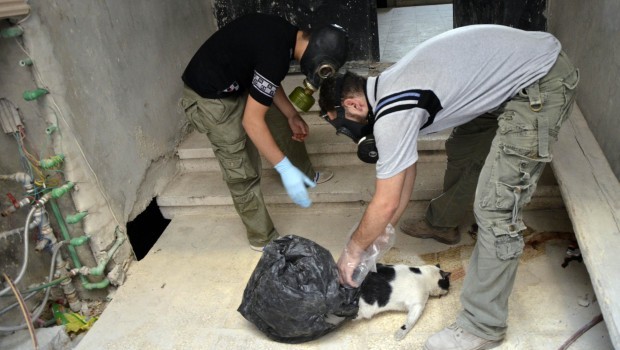
Activists wearing gas masks bag a dead cat as they collect samples to check for chemical weapon use, in the Zamalka area, where activists say chemical weapons were used by forces loyal to President Bashar Al-Assad in the eastern suburbs of Damascus August 22, 2013. (Reuters/Bassam Khabieh)
London, Asharq Al-Awsat—The international humanitarian aid organization Médecins sans Frontières (MSF), also known as Doctors Without Borders, said in a report released Saturday that three hospitals it has been assisting in the Damascus governorate of Syria “received approximately 3,600 patients displaying neurotoxic symptoms in less than three hours on the morning of Wednesday, August 21, 2013. Of those patients, 355 reportedly died.”
Allegations of a chemical weapons attack surfaced on Wednesday, although few concrete details of have emerged and the MSF report is the first outside evidence that such an attack may have taken place.
Syrian opposition groups have claimed that some 1,300 civilians had been killed as a result of chemical weapons across a number of districts in and around Ghouta—an area in which opposition forces are known to operate.
The report continued, explaining that the MSF “can neither scientifically confirm the cause of these symptoms nor establish who is responsible for the attack.”
Nonetheless, “the reported symptoms of the patients, in addition to the epidemiological pattern of the events—characterised by the massive influx of patients in a short period of time, the origin of the patients, and the contamination of medical and first aid workers—strongly indicate mass exposure to a neurotoxic agent. This would constitute a violation of international humanitarian law, which absolutely prohibits the use of chemical and biological weapons.”
MSF also stated that its supplies of atropine, a drug used to treat neurotoxic symptoms, have been exhausted. The non-governmental organization is now trying to replenish its stocks and provide additional medical supplies.
Various neurotoxin-related symptoms have been reported, including convulsions, excess saliva, pinpoint pupils, blurred vision and respiratory distress, according to Bart Janssens, MSF’s director of operations.
“MSF hopes that independent investigators will be given immediate access to shed light on what happened,” said Christopher Stokes, MSF general director.
Numerous European governments likewise called on the government in Damascus to provide UN chemical weapons inspectors with full access to the sites in question.
The British and Swedish governments went further, openly asserting that the government of President Bashar Al-Assad was responsible for the incident.
“We do believe this is a chemical attack by the Assad regime on a large scale, but we would like the United Nations to be able to assess that,” British foreign secretary William Hague said on Friday.
